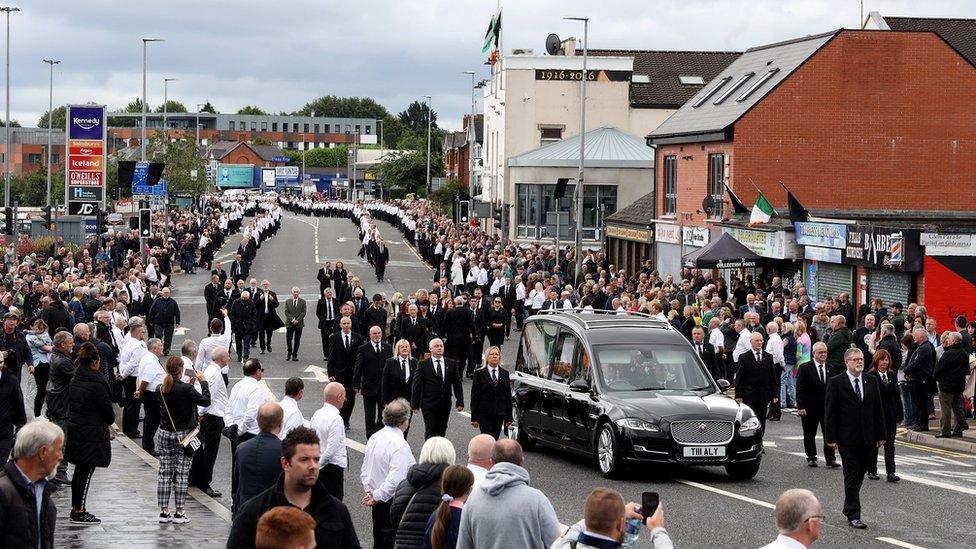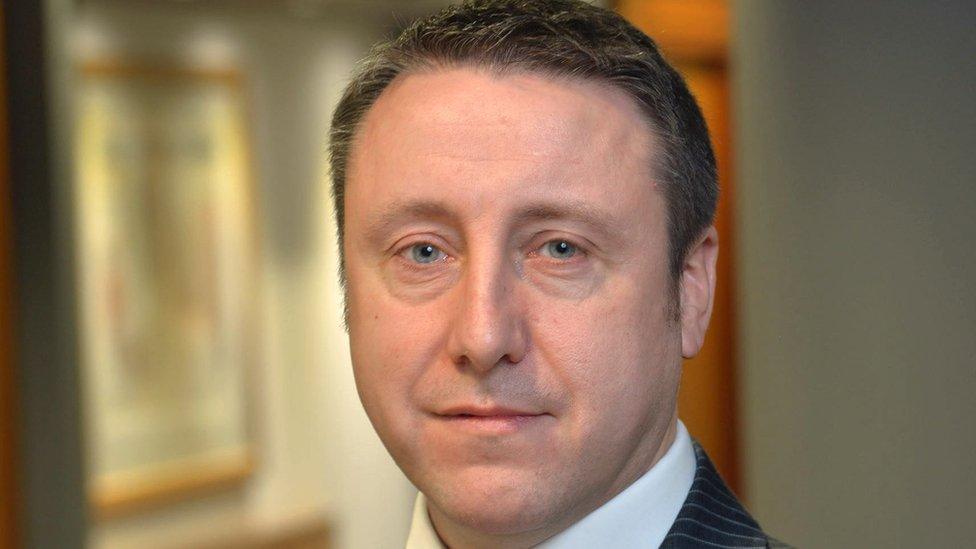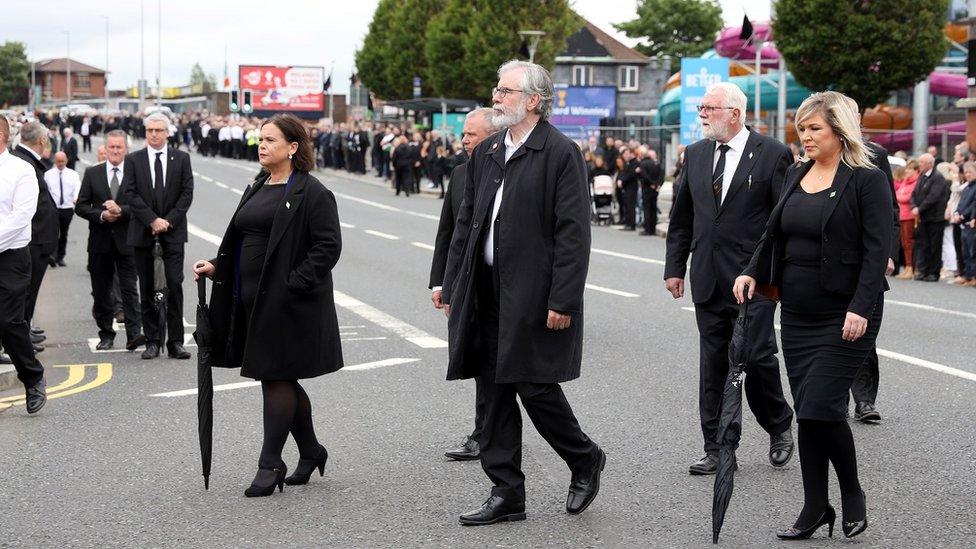Bobby Storey funeral: PPS complains to PSNI over 'confidentiality'
- Published

A large number of mourners turned out for the funeral of Bobby Storey
NI's director of public prosecutions has complained to Chief Constable Simon Byrne about a "confidentiality" breach over the Bobby Storey funeral case.
Stephen Herron wrote to Mr Byrne last month outlining concerns about PSNI actions, the NI Policing Board heard.
He complained that police made public the fact it had recommended to the Public Prosecution Service (PPS) that prosecutions should be pursued.
Mr Storey, who was a senior republican figure, died in June last year.
He had been the head of intelligence for the IRA in the 1990s.
His funeral attracted more than 2,000 mourners - including deputy first minister, Sinn Féin's Michelle O'Neill - at a time when coronavirus restrictions were in place.
The actions of 24 Sinn Féin politicians who attended the funeral were examined, including Ms O'Neill.
In its response on the day, the PSNI made clear it had recommended that the PPS should pursue prosecutions based on the evidence it had gathered.
The PSNI probe was overseen by Cumbria's Deputy Chief Constable Mark Webster.
The decision by the Public Prosecution Service (PPS) not to recommend any prosecutions in relation to the funeral of Bobby Storey on 30 March caused a political furore.

Stephen Herron was named new director of public prosecutions (DPP) for Northern Ireland in 2017
In Mr Herron's letter, the contents of which were outlined during the board meeting by Ulster Unionist Mike Nesbitt, he said it was established practice that police do not reveal what they recommend in respect of evidence files passed to the PPS.
Mr Herron said the PPS had given the PSNI advanced sight of what it was going to say on the day, but police had not reciprocated "despite several requests".
Reading from the letter, Mr Nesbitt told Mr Byrne: "And the consequence of that was that they (PPS) didn't have the opportunity to complain and warn against you putting into the public domain the fact that PSNI were seeking prosecutions.
"He said it's a well-recognised approach, both in this jurisdiction and in England and Wales, that that should be a confidential request and should not be made public.
"He goes on to say the consequence of that is that you undermine the deputy director of the PPS and the spirit of confidentiality."
In the letter, Mr Herron also told Mr Byrne: "It's important neither of us does anything that will compromise the integrity of our offices, cause damage to the longer term working relationships between police and prosecutors, or potentially compromise future proceedings."
Mr Nesbitt said Mr Herron had outlined an "incredibly serious series of allegations".

Mr Byrne says the PSNI had to make its position clear because it was facing claims it had "colluded" with the funeral organisers
Responding to Mr Nesbitt's concerns, Mr Byrne said the PSNI felt it had to make its position clear because it was facing claims it had "colluded" with the funeral organisers.
"There was a media briefing by the PPS at 1pm and we were effectively brought in to respond to that because of other commentary by other people very quickly thereafter," he told the board.
"And that probably caused some of the issues that he is concerned about.
"There wasn't a deliberate attempt to undermine or seek conflict but, as we still see at the moment, because the decision was, I suppose, momentous and some say controversial we felt we had to quickly explain our position.
"We just felt that given the enormity of what was emerging in front of us we needed to make it plain unequivocally, because we've been accused of collusion, that we had recommended prosecution."
In terms of how the PSNI recommendation to prosecute was conveyed to the PPS, Mr Byrne said it was carried out in the way normal way, by filling in relevant forms.

Sinn Féin's leader and deputy leader attended the funeral last June, along with former leader Gerry Adams (centre)
Mr Byrne was pressed again on the letter in a post-board meeting press conference.
He said the reaction to the PPS press briefing had "brought the integrity of the police service into question".
The PPS's original decision not to prosecute is currently being reviewed.
Her Majesty's Inspectorate of Constabulary is examining the police's handling of the funeral.
The PPS and PSNI have both been approached by BBC News NI for a response.
- Published30 March 2021

- Published31 March 2021
